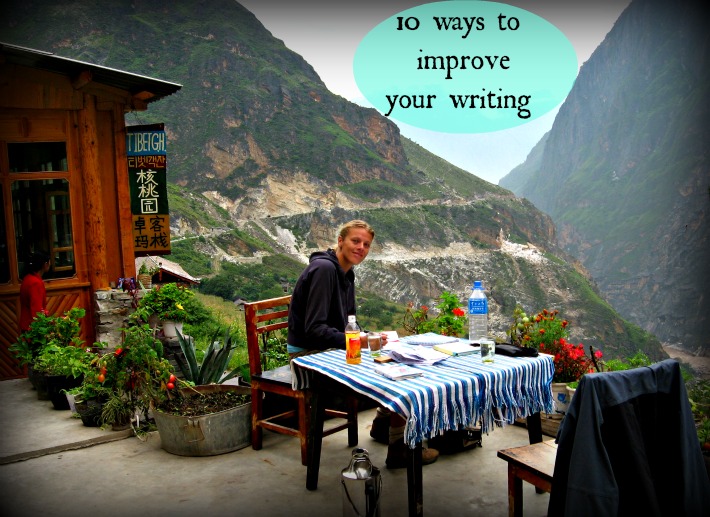10 Ways to improve your writing
A major focus of mine this year has been to improve my writing.
Blogging is a wonderful portal for expression as there are no rules and no editors telling you how wrong your thoughts are.
The literary freedom of blogging can bring problems—words that don’t flow correctly or express thoughts succinctly.
When I look back 3 years to my first blog posts, I want to hide under the table.
But, it also gives me cause for celebration because it spells IMPROVEMENT.
To succeed in blogging you have to sharpen your writing. It doesn’t have to be perfect but it does have to be good. The great news is that anyone can learn!
My study has not involved an intensive creative writing course, or journalistic degrees, but a travel writing course (more about how to be a travel writer than how to be a better writer), other writers I love, and a few good writing books.
Here are the top 10 things I’ve learned this year to improve my writing
1. It’s all about the voice
One thing I notice when reading old posts, is my voice is still consistent. This will be the biggest factor determining your success or not as a writer.
Hone in on your voice.
What makes your story unique?
Find what lies at your heart and express it. This is what readers want–the real you.
Don’t be afraid of rejection. If somebody doesn’t like your voice, lovingly allow them to leave. It means they are making more room for those who do.
You’ll find your voice with honesty, confidence and practice.
2. Edit Edit Edit
All great writers edit.
Thinking first draft is good enough is a novice mistake (guilty!).
Editing multiple times will help you find mistakes and say things in a better way.
I even edit again after publishing. I read my posts via Google reader, as I’m better able to put my reader’s eyes on via that different format. If you can, get someone else to edit–at least for the important posts. Craig is always happy to run through my posts and find the mistakes!! I also use the After the Deadline plugin which helps find spelling/grammar mistakes for me.
3. Cull Cull Cull
Sometimes we feel we need to give lots of examples or repeat an idea just to make sure our readers get it. Our readers aren’t dumb; allow them to be part of the reading process by thinking things for themselves.
Read every sentence carefully. Have you already said it, but in a different way? If so, work out the best way and cull the rest.
Watch for redundant expressions like first began. You don’t need the first in there as began tells us you started.
Another example is a sentence I wrote below, which I caught in the edit process: I use Grammar girl and Google a lot to help clarify any confusion for me.
My edit produced this cull: I use Grammar Girl and Google for clarification.
4. Make each sentence count
Mix up your sentences between short and long, but not too long. Long sentences are taxing on your readers and lend themself to confusion.
Make every sentence valuable, which leads the reader to the next.
This is the concept I am working on improving the most. Start with your article beginning, or hook. It has to be so enticing to draw them in to the whole post.
Think of how you can use quotations and dialogue, throw the reader in the middle of the drama, or give them a short snappy sentence.
5. Don’t overuse adjectives or adverbs
We’ve been told all through school how important adjectives and adverbs are; they do offer more description, but they can be overused and water down our writing.
It’s far more powerful to find one noun or verb that says what you are trying to say. Less is more.
6. Grammar and spelling are important
I am the first to put my hand up and admit that I should be imprisoned for this crime. A large part of my problem is total confusion about the rules.
After living in the US, and discovering how different our rules really are, I am so so confused about where commas go, and how things should be spelt. I can’t remember which system uses what so I often get a mixture going on.
I use Grammar Girl and Google for clarification.
Grammar will help your thoughts flow well and spelling is just easier to read. (You will get the Spelling Nazis loving the power of correcting you–another post is needed to explain my thoughts on that!)
7. Format for easy reading
This tip is purely for blogging. I rarely read a post on a blog if it is not formatted correctly. It does my eyes in, which hurts my head.
You can’t make your reader work too hard. Website readers are scanners and surfers, which is why you must cull and giving them more in less space.
- Break up your text with sub-headings and photos, and quote boxes.
- Format with numbered lists and bullet points.
- Use larger font- at least 14px and ensure your paragraphs are no more than 2-3 sentences. Large chunks of text are excruciatingly difficult to read.
- Abandon white text on a dark background- double vision and headaches is the only outcome for your reader.
8. Use mentors
Ask to work with a mentor to critique your writing for helpful feedback.
If I have an editor make a correction, I ask them why, so I can learn.
I am a member of a few writing groups where I can submit posts and get helpful feedback. I have learnt more through this process than any other.
You must have a mind that is open to learning, and with that willing to take some harsh criticism. Time to develop that thick skin and focus on the outcome it is moving you towards.
9. Study writers you love
Who do you feel just have the writing mojo? Study them.
How do they use words? How do they express their ideas and thoughts? What is their style and structure?
Learn and adapt to your voice and style. You NEVER want to copy anyone else. This is an insane practice. You want to be YOU.
Of course you can learn from others, that is how we grow, but you must mould it to yourself.
We’ve had others copy our voice before and it is slightly infuriating.
10.Practice with Risk
Write every single day. I write at least 2000 words a day.
Practice with risk. Try something new with each post. This is the best way to open up your creativity, practice what you’ve learned and hone in on your craft.
Once you take the risk and see that you didn’t die, you’ll be more willing to try it again. You’ll learn what works, what you like and don’t like. You will never ever grow unless you stretch your boundaries.
Write out of your comfort zones. Writing for a publication like Kidspot this year freaked me out! But, it improved my confidence immensely and forced me to look more closely at my writing. It gave me enough confidence to tackle the daunting topic of writing about education and hopefully sharing my wisdom!
Can you add any tips on how to improve your writing?


Comments
Enzie Shahmiri
Thank you for the great tips. There are some blog writers out there who write with such a strong voice that I have followed their blogs strictly based on how wonderfully they have expressed themselves. I just wish more people would leave comments on blogs, so that the blog owners get a better idea how their content is being received.
Caz Makepeace
Agree Enzie! You are often left wondering if you are doing the right thing, comments are a great way of understanding that and knowing how to improve. I do understand how difficult it is for many people to comment, they just don’t feel confident enough to share their opinions on a public space. It is pretty daunting.
I will often overlook a lot of mistakes if the voice is strong enough, that i what I most want to hear and follow.
Joy
Caz thank you! This is soooo helpful!
Caz Makepeace
Pleasure Joy! I’m glad it helped as I often am a work in progress, but I’ve been learning a lot so thought I’d share
Mrs Woog
I always think WRITE OFTEN AND WRITE BRAVELY. Great post Caz x
Caz Makepeace
Each new attempt at braveness makes you that much braver. I’m quite often in a state of nervousness when hovering over publish, but I persist in doing it, and I survive every single time!!
Rachel Noble
Couldn’t have said it better Mrs Woog! Great piece Caz x
Jeremy Branham
I’ve gotten better at 1 and 7. I don’t edit as much as I should. Some posts are better than others. I need to improve on a lot of these.
In a bit of irony, “#6 Grammar and spelling” has a grammatical error. It should say “Grammar and spelling are important” 🙂
Caz Makepeace
ArgHh!!! I told you I was hopeless!! I edited this one about 5 times too. Have corrected it and thank you for the heads up Jeremy!
Pretraveller
Caz, thanks for your tips. I have been progressively been working this year to improve my writing. While I am certain that I been doing better I have also been having some self imposed deadline issues. As a result I have had a few cases where I have finished writing an article on the day I planned to publish it, which is not good at all for self editing.
Caz Makepeace
Oh yep!! Sure do understand that. That is when you need your back up plan, “Do the best you can with whatever you have from where you are!” I use that often 🙂
Jo Castro
10 great tips, Caz and I especially like the grammar girl and google tip. Going to check it out right now. I agree about editing, editing and editing some more. Sometimes it’s difficult to do this though in this fast blogging world, but if at all possible I like to put my post out of sight for 24 hours before I edit it with ‘fresh eyes’. Otherwise, like you, I often tweak it again after it’s published 🙁
Caz Makepeace
Blogging makes it so hard to keep up with the editing. I always do a much better job when I write for other sites. I think the more you do it the more efficient you get with it